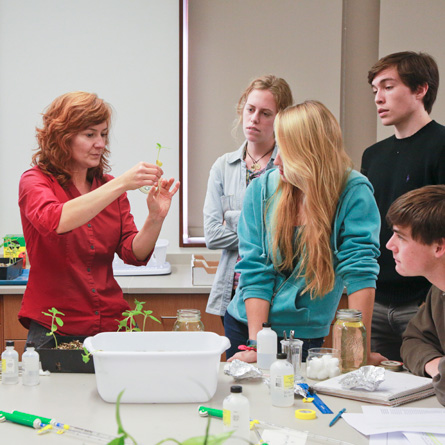
College awarded $1.025 million to establish the Richard H. Goodwin Environmental Fund

The Conservation and Research Foundation recently awarded Connecticut College $1.025 million to establish the Richard H. Goodwin Environmental Fund within the College’s endowment. The fund will solidify the College’s reputation in the areas of botany and environmental studies by supporting student and faculty engagement.
The funding will be separated into four critical areas of the College’s environmental programming: The Goodwin Environmental Research Fellowship; The Goodwin Long-Term Environmental Monitoring Fund; The Goodwin Visiting Scholar in Botany Program; and The Goodwin Award in Environmental Studies.
“This funding will foster a new generation of scholars and professionals who are knowledgeable about the environment and the current challenges posed by human activity,” said botany professor Rachel Spicer. “The support of the Conservation and Research Foundation will further strengthen the College’s reputation as a leading center for the study of botany and environmental science.”
The Goodwin Environmental Research Fellowship will be awarded to one or more outstanding rising seniors who plan to conduct thesis work with a College faculty member. Students will apply to receive up to $12,000, which will include a summer research stipend of $4,000, funds for travel and supplies to support research activities, registration to present at conferences, and possible funds to support student research away from the College. The level of support for supplies, travel and conference attendance is unprecedented at the College, and is expected to significantly increase student-authored, peer-reviewed publications.
The Goodwin Long-Term Environmental Monitoring Fund will provide multiple summer stipends for students, with an emphasis on engaging sophomores and first-year students in environmentally oriented field work. A periodic recurring amount will be deposited into the fund, designated for three long-term environmental monitoring projects. Funds will be used to provide $4,000 summer stipends to students collecting field data, as well as travel costs to field sites and supplies.
The Goodwin Visiting Scholar in Botany Program will bring outstanding faculty and renowned experts from other institutions to the Botany Department at the College. The fellowship will be awarded every other year and will last for one full academic year. The visiting scholar will teach two courses and may have opportunities to engage in research, enriching the program’s course offerings and establishing cross-institution relationships.
The Goodwin Award in Environmental Studies is an existing, merit-based student award currently funded by the Environmental Studies Department. An award of $500 will be given each year to the graduating senior in environmental studies with the highest GPA.
The fund is named in honor of the late Richard H. Goodwin, Katharine Blunt Professor Emeritus of Botany and former chair of the Botany Department at the College. An internationally renowned proponent of plant biology, Goodwin also served as director of the Connecticut College Arboretum, helping the size grow from 90 acres to 450 acres. In 1969, he helped the College create one of the nation’s first environmental studies programs.
“Dick Goodwin’s leadership and vision positioned Connecticut College at the forefront of environmental education at a time when land conservation and sustainability were barely understood in higher education,” President Katherine Bergeron said. “We take seriously our role as caretaker of his legacy.”
The Goodwin-Niering Center for the Environment, one of five interdisciplinary centers at the College, is named in Goodwin’s honor.
December 14, 2015
